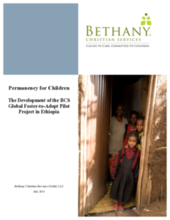This report provides initial documentation of a pilot program launched by Bethany Christian Services in 2009 in Ethiopia. An estimated 5 million Ethiopian children (0-17) were identified as having lost one or both parents, as a result of HIV and AIDS, other diseases such as TB and malaria, extreme poverty and famine and migration (2005). This situation has left families financially stretched beyond their limits in providing the traditional model of orphan support and has resulted in increased reliance on institutional care. In order to address this situation the Bethany Christian Services launched a pilot program in 2009 that aimed to move children from institutional care to family-based care (deinstitutionalization) by developing alternative family care for non-relative children using a foster-to-adopt approach. The project used foster care as an intermediary service, preparing families for permanency through the new concept of non-relative adoption. It was carried out in three cities, Addis Ababa, Awasa, and Adama, where the presence of Christian faith is prevalent.
It adopted a partnership approach between Christian evangelical communities in Ethiopia and faith congregations in the US to provide sustainability to the project through the long-term commitment that churches make with partner communities. Ethiopian churches were engaged to identify and recruit foster families, increase community connections, and support families to care for vulnerable children. The approach drew from the communities’ Christian faith and presented that faith as a resource that the community can use to extend care to non-relative orphans within their communities.
Bethany hired and trained social workers and partnered with Kingdom Vision International, a local faith based orphanage, to deliver services to families who cared for the children. More than 110 families were recruited during the first project cycle and the goal was to place 75 children into local Ethiopian families. The families underwent Home Study assessments done to ensure their suitability to care for a non-relative orphan that were then approved by the local government. Families also attended the initial 24-hour training required to be licensed as foster parents. Foster families were prepared from the outset for adoption (permanency) in the long term.
The report provides some of the initial lessons learnt, including the challenges faced in developing a foster care model in the absence of comprehensive laws regulating foster care and adoption, and difficulties in the matching process between children and families, as most families were found to prefer foster children who were younger and female. A formal project evaluation is due to be undertaken.

